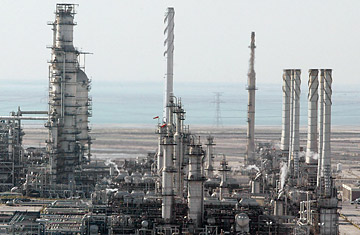
Ras Tannura's oil production plant near Dammam in Saudi Arabia.
Pity Dick Cheney, when Air Force Two lifts off on Sunday for the Middle East. Reviving the Israeli-Palestinian peace talks looks to be the simpler part of his mission, compared with the task that awaits him in the Saudi capital of Riyadh — persuading the 13-country OPEC cartel to help bring down the soaring price of oil by boosting output. As cynics might say, good luck with that.
The stakes could hardly be higher: With a U.S. recession looming and the dollar at its lowest-ever value against major currencies, oil prices reached a new record high on Thursday, crashing through the $111-a-barrel mark. That's a climb of about 30% in just six months, and this week it sent the prices at U.S. gas pumps soaring to a record national average of $3.27 a gallon.
President Bush last week urged Saudi Arabia — the world's leading oil producer — to help ease the crisis by pumping more oil onto the world market. He made a similar appeal in person when he visited King Abdullah in January. And now comes a new attempt by Cheney, as part of his 10-day trip to the region to discuss a number of crises. But oil analysts believe Cheney is unlikely to be any more successful than Bush has been.
Washington argues that a deep economic downturn in the United States — which consumes a quarter of the world's energy — could drive down global demand for oil, and wind up hurting oil-rich countries. But OPEC's 13 oil ministers — whose countries account for about 40% of the world's oil supply — have heard that argument from U.S. officials before, and have rejected it at three meetings in the past six months, most recently in Vienna on March 5. There, U.S. foes Venezuela and Iran took a lead in arguing against raising oil output.
The Saudis might find it politically difficult to change their position without consulting fellow OPEC members — who would surely reject the idea — says Greg Priddy, energy analyst for the Eurasia Group in Washington. "It would be a real loss of face if all of a sudden they would reverse course unilaterally," he says. Cheney's visit to Riyadh might be too late, says Priddy, adding about U.S. officials: "If they were going to ask [for increased oil production] they should have asked a month ago."
The Bush Administration could be working on the assumption that the Saudis and other allies could quietly increase production unilaterally, and relieve pressure on prices. After all, OPEC output quotas are hardly effectively policed. But analysts believe that assumption may be false. Priddy believes Americans might be unfairly pinning the blame on oil-rich countries. "They want to find someone to blame and Gulf countries aren't popular to begin with," he says. But producers are contending with rising production costs, while extracting oil has become more difficult as land-based wells with plentiful reserves have been depleted in many places, leaving expensive, complicated deep-sea drilling as the best hope for tapping massive new reserves.
The even larger problem facing Washington, however, is that as pricey as oil is these days, there's no shortage of customers elsewhere in the world. (There are also plenty of investors pouring billions into oil futures as a hedge against the falling dollar — and so driving up oil prices even more.) The major reason for the current high prices is that OPEC's production has been seriously stretched by the huge increase in demands from booming China and India, as well as from oil-rich countries in the Middle East itself, says Lawrence Eagles, chief economist of the Paris-based International Energy Agency, the watchdog for oil-consuming countries like the United States and those in the European Union. "Most OPEC members are working close to flat-out," he says. "There is little spare capacity outside of the United Arab Emirates and Saudi Arabia, and some of that is relatively poor quality crude." And right now, global demand continues to rise.
OPEC members are also haunted by the organization's misstep in 1998, when they voted to boost production quotas shortly before the Asian economic crisis hit. That sent oil crashing to $10 a barrel. Such prices may now seem like ancient history, but as Cheney flies out to the Middle East, he'll be visiting a region where ancient history can seem very fresh indeed.
